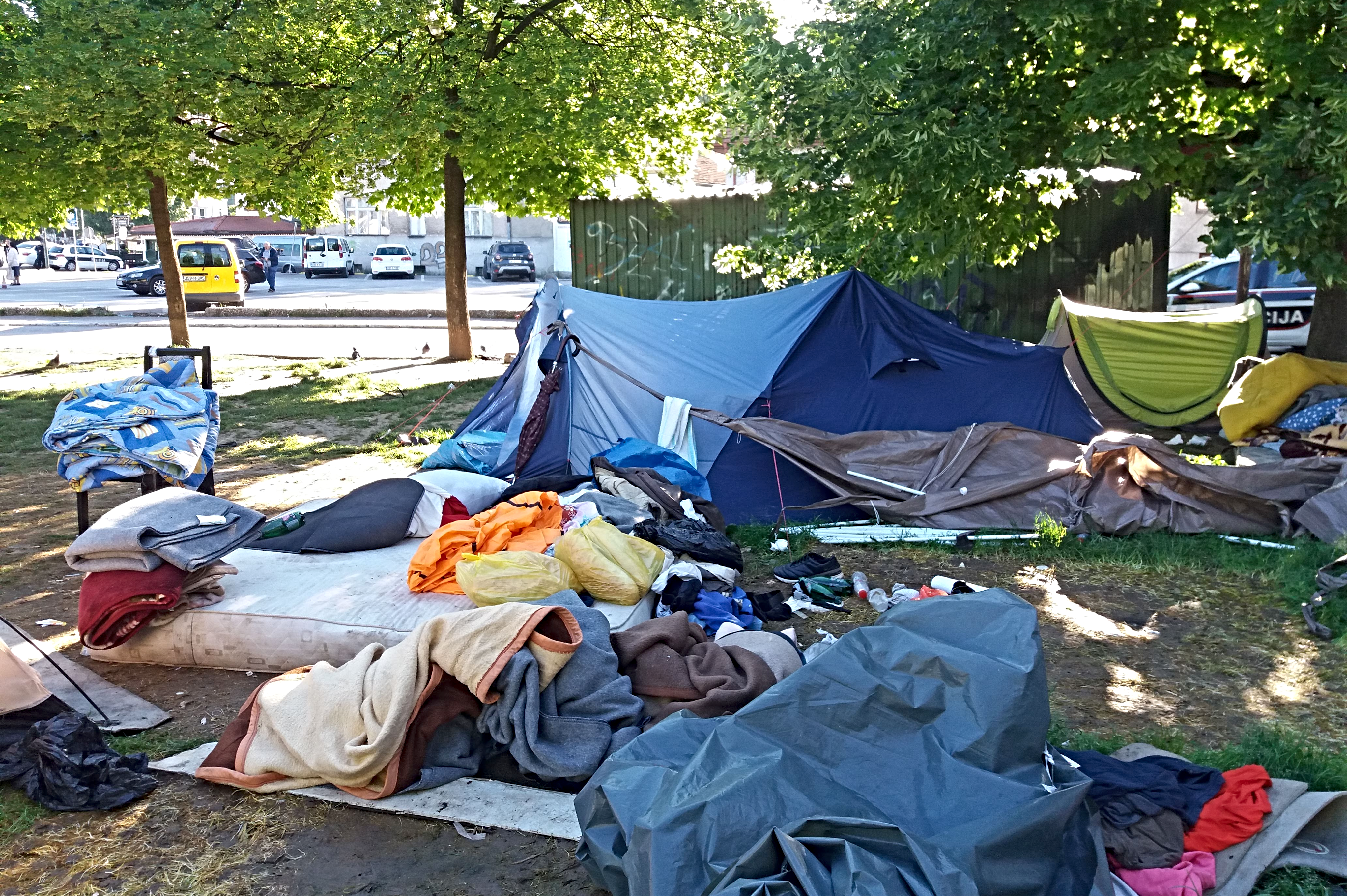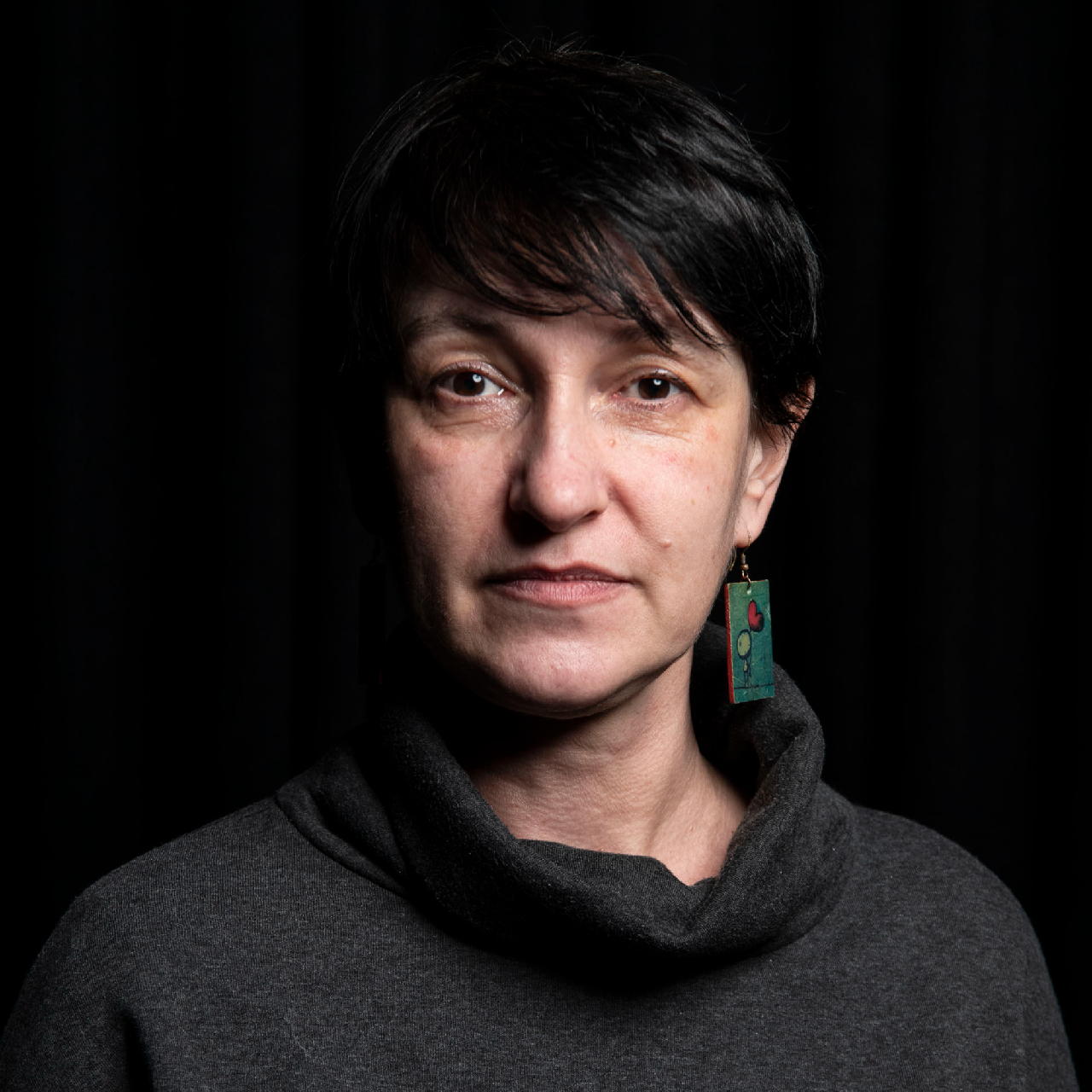Last Friday (May 19) at 5 a.m., more than 250 people were evicted from the makeshift camp in the old part of Sarajevo. Since February, refugees and migrants had been coming to this place, where neighbors and volunteers were bringing them food, clothes and shoes, helping them to find medical assistance, and taking people inside their homes to rest or to have a shower.
To begin with, only single men were coming to the park, but by the end of March, families were there, too. They came from Syria, Yemen, Nigeria, Afghanistan, Tunisia, Morocco and tended to find shelter in people’s homes or hostels, with many Bosnian citizens ready to demonstrate their solidarity. In April, as numbers increased, some started putting up tents and sleeping in the park, since the state did not provide accommodation or any kind of security.

Photo: Nidžara Ahmetašević / K2.0.
According to the state Ministry of Security, over 4,000 people on the move entered Bosnia in the first four months of this year alone; some heading to Sarajevo, others to the areas around Bihać and Velika Kladuša on the border with Croatia, hoping to cross the border and continue toward Western Europe.
Last week, those in the Sarajevo park were evicted, two days before Turkish president Recep Tayyip Erdoğan came to visit and take part in the big election rally organized by his party. He and his friend — as they call each other — Bakir Izetbegović, the Bosniak member of the tripartite state Presidency and member of the main Bosniak Party of Democratic Action (SDA), were originally supposed to walk around the Old City, and have their iftar meal together. In the end, this part did not happen.
Nevertheless, refugees and migrants — many of them having expressed their intention to seek asylum — were sent to the Salakovac camp in Mostar, recently renovated with the help of the UNHCR. The decision was made at the state level, and overseen by the state Ministry of Security with the involvement of the state Ministry for Refugees and Human Rights.
On the way from Sarajevo, the Canton of Sarajevo’s police accompanied the convoy of five busses to the edge of its area of jurisdiction; the cantonal border with neighboring Mostar Canton. However, after the busses entered Mostar Canton, Mostar special police stopped the convoy, saying that the trip had not been announced in advance.
In doing so, they challenged the very existence and authority of the state, given that the decision to relocate the migrants and refugees was taken at the Council of Ministers level, which has jurisdiction over asylum seekers. The busses were forced to go back to the invisible border between the two cantons, with the more than 250 people from the Sarajevo park on board.

Photo: Nidžara Ahmetašević / K2.0.
Already tired after days living in inhuman conditions, people were left for four hours in the middle of the road. Volunteers and locals were there to help, emergency medical care was called for, the police were edgy… The entire country followed this drama that was happening at the Ivan-sedlo pass as it was beamed out on TV and over the internet.
After several hours, state Minister of Security Dragan Mektić held a press conference, transmitted live on several nationwide TV channels. He said that what was going on was an “attempted coup” and that he would ensure that the head of the Mostar Canton police was arrested.
“We have police forces on one side and armed police on the other side. What the police from Mostar are doing is illegal and against the Constitution,” Mektić said. “If we realize that we do not respect the Constitution and the law, it means the system is breaking up.”
Soon after he had delivered his address, the convoy continued and finally reached the Mostar camp, where people were accommodated and finally placed in decent accommodation.
Politicking rules supreme
Days later, the exact course of Friday’s events is still unclear. However what seems to be generally agreed is that, just like so many things in Bosnia — especially in an election year — political calculations and maneuvers are at the incident’s core.
According to some media reports, the head of police in Mostar never issued a written order for the convoy to be stopped. Some are speculating about possible influence from the leading party in that area, the Croatian Democratic Union (HDZ).
Josip Grubeša, state Minister of Justice and also a member of HDZ, has also contradicted his Council of Ministers colleague Mektić, who is part of the Serb Democratic Party (SDS), by saying that according to the law in Bosnia and Herzegovina there is no such offense as a ‘state coup.’ “It is more a colloquial term that is not recognized by the law,” he said.
Despite being part of the Council of Ministers that took the original decision to move the migrants and asylum seekers to Mostar, Grubeša also claimed that the state government cannot make decisions on where they are accommodated; he did not offer a suggestion as to who he believes this competency falls to instead.
Almost simultaneously, the president of the Republika Srpska entity, Milorad Dodik — who has announced that he will run for the state Presidency this October — issued his own statement on housing migrants in Republika Srpska, even though the entity under his jurisdiction was not directly affected by Friday’s incident.
“We will not let anybody in Sarajevo determine how we will act in regard to this question,” he said, repeating previous assertions that he would not allow any type of center for migrants in Republika Srpska. Previously, Dodik has said that Republika Srpska will secure “safe and fast passage” through its territory.
Meanwhile, on Saturday, the head of Mostar’s cantonal level police was summoned to give a statement to state security services; it remains unclear what will happen next.
Dysfunctional decision making
With confusion reigning supreme, the whole affair only proves — once again — how dysfunctional and complicated the decision making process in Bosnia and Herzegovina is, with the latest incident acting like a litmus paper for the whole system.
The state is still treated as a semi-protectorate over two decades after the war that ended in 1995 with the Peace Agreement signed in Dayton, U.S.. The agreement created a complex and layered structure that regularly leads to political stagnation and impasse, and that has allowed politicians to capture the state.
A 2014 International Crisis Group report that could be challenged in many instances nevertheless captures the essence of Bosnian political culture, when it concludes that: “an informal ‘Sextet’ of party leaders in effect controls government and much of the economy. A multi-ethnic coalition persists, election to election, with only minor adjustments. Membership is earned by winning opaque intra-party competitions in which voters have little say.”
They also concluded that power is further reinforced by “control of hiring, investment and commercial decisions at state-owned firms, a situation that chokes private investment and growth.”
Faced with this daily reality, citizens in Bosnia are finding it harder and harder to cope. Many have decided to leave the country in search of opportunities elsewhere, but an even greater number have become almost completely apathetic, unable to see how to change the current state of perpetual political deadlock.
Making any changes to the Constitution, which in reality is still an Annex of the quarter-century old Dayton Agreement, is extremely difficult and often politicized to the extent that it is completely impossible.
Just one example of this is the 2009 decision by the European Court of Human Rights, concerning a claim by Azra Zornić against the state of Bosnia and Herzegovina over people’s rights to run for top posts in the country.
According to existing laws, only members of one of the three majority ethnic groups — Serbs, Croats and Bosniaks — have the right to hold a position at the Presidency or the House of Peoples. Zornić complained, stating that she was unable to run for these posts because she had declared her identity as a citizen of Bosnia and Herzegovina, without any ethnic affiliation. The court backed Zornić’s claim, and ruled that the Constitution should be changed, but the decision has never been implemented.
Road toward change?
The arrival of migrants and refugees in this type of dysfunctional, barely-existing state can lead to one of two results. One is total catastrophe, in which the solidarity that has existed until now ultimately gets killed off by xenophobia and dehumanization through the media, which is often controlled by different interest groups, mostly associated with political parties.
The second option is that the solidarity will survive, and local decision makers will understand that the arrival of people with different skills, cultures, languages and knowledge is something that can revive the state, and life in Bosnia and Herzegovina in general.
Šuhret Fazlić, the mayor of the city of Bihać, close to the EU border in the north of the country, is the first to have opened up such a possibility. He has not only welcomed refugees, but is starting to consider how to help them integrate into society and see what good can come out of it for everybody. For now though, the ideas remain very much at the conceptualization stage.
If a more welcoming atmosphere were to be created, maybe refugees could ultimately even be embraced as Bosnian citizens; this could even finally lead to the Constitution being changed, or written in a way that really responds to the needs of all citizens, not only ruling politicians and people who declare themselves as members of one of the three constituent ethnic groups.
So far, this appears to be a distant prospect, since leading political actors are happy with the status quo; this leads to preventing people from accessing the asylum process, just as it prevents existing citizens from seeking elected office if they are not Serbs, Croats or Bosniaks.
Most politicians are simply not capable, willing or able to help.
Political games, in which anybody and anything can be used tokenistically, are part of the political reality. For years, politicians have used war survivors, especially women, to manipulate; instead of helping the process of healing society, they have done everything to freeze the fears and hatred from the war in order to use it to keep power. The political language is based on ‘us’ and ‘them,’ where ‘us’ are always victims and ‘them’ culpits.
Now, with the arrival of people on the move, all the weaknesses of the state are becoming even more visible.
People are again being turned into tools for ruling political parties in their election campaigns, from the latest incident of transferring people from Sarajevo to Mostar, to the numerous other political quarrels about migrants and refugees in recent months. Time and again, politicians and the media they control are maintaining the ‘us’ and ‘them’ narrative, insisting on talking about security rather than humanitarian issues and simple solidarity.
With the overly complex state structure, too many layers of government and ruling political elites that are focused solely on party and personal interests, it’s hard to see a way beyond the current situation. And the election campaign has only just begun. K
Feature image: Nidžara Ahmetašević / K2.0.



